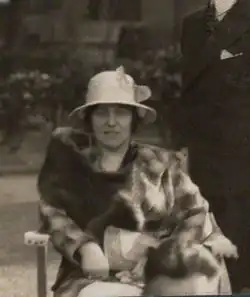Hope Mirrlees

Hope Mirrlees (8 April 1887 – 1 August 1978) was a British translator, poet and novelist.
Sourced
Lud-in-the-Mist (1926)
- Pride and resentment are not indigenous in the human heart; and perhaps it is due to the gardener's innate love of the exotic that we take such pains to make them thrive.
- Without respite he is dragged by the two wild horses, memory and hope; and he is tormented by a secret that he never can tell.
About Hope Mirrlees
- The year after Harrison’s death Mirrlees converted to Catholicism, and for the next twenty or so years lived with her mother in South Kensington, London and later Surrey. (TS Eliot staying with them during the war?) For many years Mirrlees worked on a Harrison biography that was never published. She also planned a many volume biography of the 17th century antiquarian Sir Robert Bruce Cotton, and published the first volume as A Fly in Amber (Faber & Faber, 1962).
After her mother’s death in 1948, Mirrlees moved to South Africa, a country she had visited as a child due to her father’s business interests, and lived there for fifteen years. She returned to England in 1963, settling in the Oxford suburb of Headington, and published three slim poetry volumes in the sixties and early seventies, revised and expanded in Moods and Tensions (Amate Press, 1976). Mirrlees died in 1978 at the age of ninety-one.- Sophie Levin, Hope Mirrlees. Paris: A Poem (paris-a-poem.com).
- Hope Mirrlees's 1926 novel Lud-in-the-Mist, about the scandalous banishment of the Faerie folk by law-abiding conventional inhabitants of the town Lud-in-the-Mist, is sometimes characterized as "high fantasy" in the manner of J.R.R. Tolkien's later, but more celebrated, work, The Hobbit (1937), for its "hobbit-ish" sounding names and settings. .... Perhaps, too, it is often assumed to lean that way because Mirrlees also coincidentally penned another obscure-but-brilliant text, Paris: A Poem (1919), published by Virginia Woolf's Hogarth Press, written in what scholars consider a "high Modernist" style. ... But, "high" can sometimes be too easy a critical reach, and, in the case of Lud-in-the-Mist, it's decidedly misleading.
- Jean Mills, "Chapter 7. Obscene, Grotesque, and Carnivalesque: Hope Mirrlees's Lud-in-the-Mist as Menippean Satire". The Female Fantastic: Gendering the Supernatural in the 1890s and 1920s. Routledge. 2018. (edited by Lizzie McCormick, Jennifer Mitchell, and Rebecca Soares)